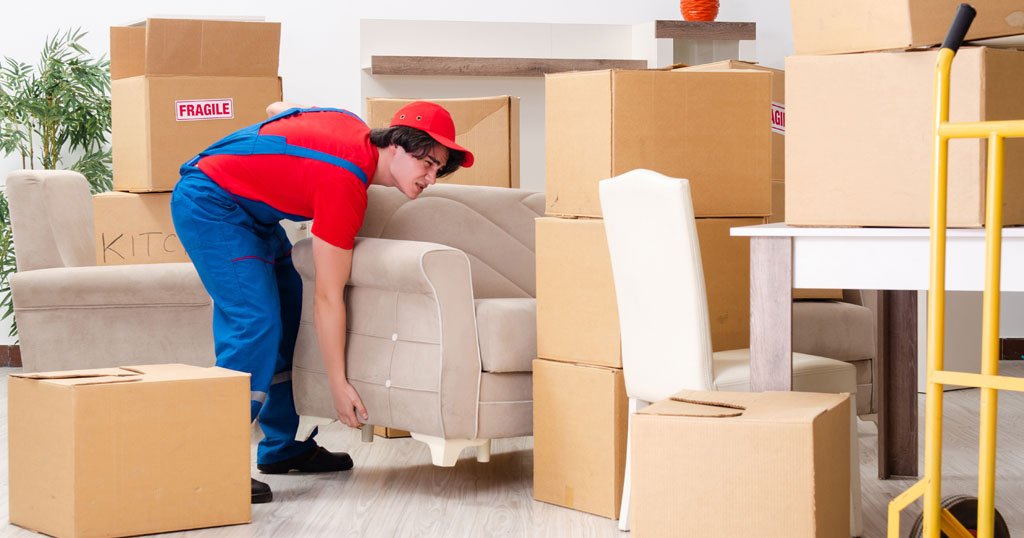Tips for using a packing service
Removal companies usually offer a packing service where their team packs everything on your behalf. It saves you a lot of time and removes a lot of the stress from you during this busy period. It also means your items are properly insured.
You’ve already had the removal company’s estimate on how many cubic feet/metres will be packed. If you have a relocation package you may have a limit to how much you can ship overseas and this will have been agreed. Remember this figure as you will be liable to pay for anything over that limit.
Admittedly, it’s quite hard to step back and watch strangers take over your house, wrapping and packing all your worldly possessions, but if you follow these pointers, the event will be less nerve-wracking.
Preparation for the packing crew

Signs with words on have been ignored in the past, but the no-entry symbol seems to be recognised by everyone, whatever their language.
Anything that can be packed will be packed. That includes full dustbins, teapots containing tea bags and any random thing that’s in their way. Make sure you have a major tidying up session before the packers arrive.
Put everything into its rightful place. All kitchen stuff should be in the kitchen, for example. This will make the room-specific boxes easier to unpack at the other end.
If you still have the original packaging for any items, pack them yourself and fill up any excess space with other things.
To make the most of your weight allowance, prepare in advance by using up all spare and otherwise empty space. The idea is to fill up any gaps you can by stuffing socks into shoes, tea towels into the corners of the TV packaging and so on.
Vacuum pack soft, bulky items such as duvets, soft toys and thick clothing.
Getting overwhelmed?
Now is the right time to get out your ‘Super Scary To-Do List’ Buster and get busting! It’s ideal for times right now when there’s so much at stake.
Keep an eye on how much is packed
While it’s tempting to hide when the packers are in, don’t! You need to keep an eye on what’s going on at all times, especially if you have items that are not to be packed. Labels fall off.
If you have a weight limit or allowance it’s absolutely vital to work with this otherwise you may be hit with a very large excess bill.
Confirm the weight limit agreed by your company and/or the estimator with the packing crew when they arrive.
Get the packers to tell you how the figures are shaping up. As they load boxes onto the lorry they are aware precisely how much the volume is adding up.
At the end of the packing you will need to sign a form. Ask the packers to write on the form what they estimate the weight/cubic measurements your now boxed effects are, and sign it after they’ve done this. Then, if you discover later that you’ve been charged an excess, you will have grounds to query it.
Keep the packers happy
Packing crews will be helpful if you are nice to them! Supply them with lots of tea or coffee and perhaps a surprise lunch. If you’re already overseas, consider what they’d be likely to eat in that country. Or order pizza!
Insurance
Purchase insurance for your belongings to cover them during the entire transit. While the removal company may insure your goods there may well be a different company used for the shipping and yet another for the relocation and unpacking at the destination. Protect yourself by getting your own in-transit insurance.
If something goes wrong
Keep a folder of receipts in case you need to make a claim for damages.
If you go over your limit and the extra items have to be taken, you may want to dispute how inaccurate the estimator was. Get the crew onside and document everything, with witnesses, and challenge the company. Estimates should not be so far out, but it does occasionally happen.
Unpacking
I wrote a full article on unpacking here, key points below:
Have your camera ready to photograph any damaged boxes and contents in case you need to make an insurance claim.
If you choose to have a crew unpack for you at your destination, you’ll need to have nerves of steel! Personally I prefer to unpack it all myself; it’s slower, but I find it satisfying.
The boxes will be deposited in the allocated rooms. Label the doors with something like ‘bedroom 1, bedroom 2, study’ etc.
Have the team unpack one room at a time so that you can be in that room with them.
In your kitchen it is helpful to label cupboards with ‘plates, glasses, saucepans’ and so on. This becomes a little tricky if your language skills aren’t up to scratch, but I’m sure you’ll cope!
If you’re unpacking it yourself, don’t take too many weeks over it as the removal company will want to return to collect all the packaging and boxes.
Good luck with your move!
Don’t forget your packing lists
Originally published: 29th May 2013
Updated 28th June 2019




Some really interesting unpacking tips. It’s good thinking to keep camera handy for clicking pictures of damaged boxes. I
also completely agree with Laurie, to get separate transit insurance
for your belongings. In addition to this, don’t forget to read
insurance documents carefully to avoid any later hassle and confusion.
Hi James,
Thank you for your comments. I (just about) survivied my own packing day on Monday and I’m still of the opinion that I’ll be unpacking it myself. In fact, I may just never unpack again so I don’t have to go through the palaver ever again!
Insurance is sorted 🙂
Actually, you need to buy separate insurance yourself to insure your belongings during the move. Often the company that packs it is different from the company that ships it which is different from the company that unpacks it, and unless you can specifically prove one of them was at fault (very hard to prove) you won’t be covered for lost or broken items. I always buy in-transit insurance for my belongings. I’ve heard of entire shipments “falling off the boat” and having to be replaced.
Thank you so much for that valuable information, Laurie. I shall add that to the articles right now.
And I will also, if you don’t mind, completely ignore your last sentence!!!